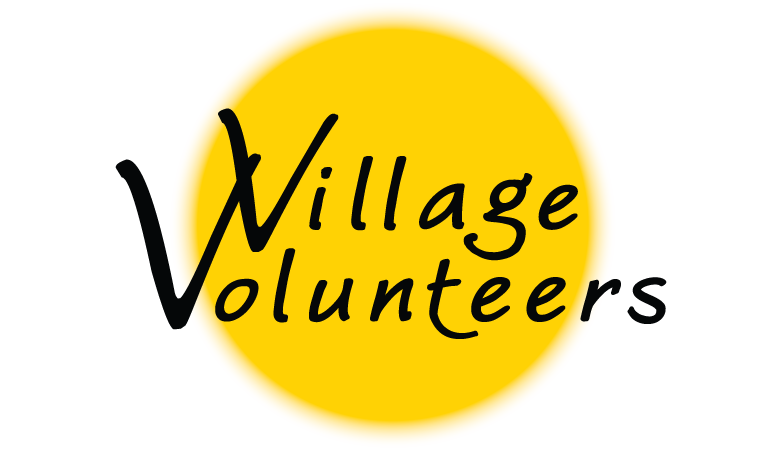Ghana: Ryvanz Mia Children’s Home
Ryvanz-Mia Children’s Home provides orphaned and vulnerable children with proper care and nurturing, nutrition, shelter, clothing, medical care, and education. The home cares for children without parents, promotes early childhood development, and trains children to become responsible and useful citizens in their communities. This is truly a home of love.
We love helping volunteers find their perfect placement. Fill out our Interest Form to get started!
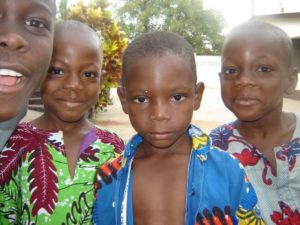
Ryvanz-Mia is a home located in Kpando Village, Volta Region, Ghana, and is open to children from all communities regardless of ethnic background, faith, gender, and culture. Their motto is “Liability today, asset tomorrow”. Ryvanz-Mia began in August 2006, when Mrs. Regina Esime Djentuh (aka Mama Esi) began caring for the orphaned children of Kpando Village. Having lost her own father at a young age, and her own children having lost their father, Mama Esi decided to offer care for the orphaned children of Kpando and its surrounding area. With limited funds, Mama Esi and her children converted their home into an open space to accommodate orphaned children. Relying on her personal funds and selling homemade pastries, Mama Esi was able to expand the orphanage and take in more children. Today, she has nineteen children under her parental care.
VOLUNTEER OPPORTUNITIES AT RYVANZ-MIA
Education/Children: Ryvanz-Mia Childcare International currently is home for 19 children, ranging in age from 5-18 years old. Volunteers are 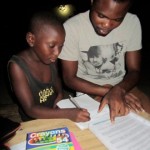 encouraged to help in the daily care of the children (such as helping the younger children get dressed for school, laundry, cooking, and cleaning). Additionally, volunteers may undertake home improvement projects at the children’s home. There are many opportunities for individual tutoring sessions outside of school hours. Ryvanz-Mia has connected with a number of area nurseries, primary, and junior high schools. Volunteers are invited to teach at these schools, serving in conjunction with a local teacher. Volunteers serving in a school setting are encouraged to bring along with them some basic teaching materials as schools often have very limited educational resources.
encouraged to help in the daily care of the children (such as helping the younger children get dressed for school, laundry, cooking, and cleaning). Additionally, volunteers may undertake home improvement projects at the children’s home. There are many opportunities for individual tutoring sessions outside of school hours. Ryvanz-Mia has connected with a number of area nurseries, primary, and junior high schools. Volunteers are invited to teach at these schools, serving in conjunction with a local teacher. Volunteers serving in a school setting are encouraged to bring along with them some basic teaching materials as schools often have very limited educational resources.
Special education– Ryvanz-Mia has partnered to work with the Kpando Community Inclusive School. Through our partnership we have been able to be involved in our volunteer’s renovating the school’s roof, build a urinal, paint classrooms/dorms and teach at the school.
Adult education– Many neighboring adults have expressed interest in adult education classes to be held at Ryvanz-Mia. The focus for these classes would most likely be on basic budgeting and literary skills.
Teaching strategies– Schools we have partnered with have expressed interest in attending workshops by volunteers who are trained teachers in classroom management, phonics, and other educational strategies. The following describes the typical schedule for a volunteer.
Monday through Friday:
- In the morning, help dress and feed the children.
- During the day, teach at the nearby Delta Preparatory School which many of the orphans attend, or help care for the younger children and do household chores.
- In the evening, play games or read with the children, and help the older ones with their homework.
Weekends:
- Saturdays are spent doing chores. If everything is completed, the children are rewarded with a movie on Saturday nights.
- Sundays, volunteers are welcome to attend church with the children.
School Holidays:
When school is out of session, volunteers are invited to coordinate summer camp programs.
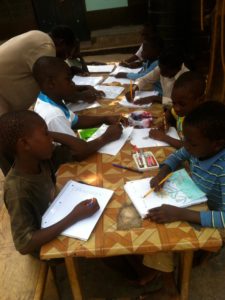 Note: An academic school year runs from the beginning of September until the middle of July. The school year is broken down into three terms, with approximately three to four weeks of vacation between terms. Usually, the term holidays run from the middle of December to middle of January, end of March to middle of April, and middle of July until the new school year begins in September. During the breaks from school following the first and second terms the schools are typically completely closed. However, after the third term, before the start of the new school year, many of the schools in our area (which volunteers could be placed at) have “extra vacation classes.” These classes are generally only half of the normal school day. While teaching at a school may not be available 365 days a year, there are always opportunities to teach additional lessons at Ryvanz-Mia’s Children’s Home to children living at RM and/or for children from the community. We have a diverse age and ability range that is eager to learn any day and time! Additionally as our children’s home is the only home any of the children in our care have, our children’s home is running 365 days a year. Our children keep us busy and there is always something to do, no matter the time of the year.
Note: An academic school year runs from the beginning of September until the middle of July. The school year is broken down into three terms, with approximately three to four weeks of vacation between terms. Usually, the term holidays run from the middle of December to middle of January, end of March to middle of April, and middle of July until the new school year begins in September. During the breaks from school following the first and second terms the schools are typically completely closed. However, after the third term, before the start of the new school year, many of the schools in our area (which volunteers could be placed at) have “extra vacation classes.” These classes are generally only half of the normal school day. While teaching at a school may not be available 365 days a year, there are always opportunities to teach additional lessons at Ryvanz-Mia’s Children’s Home to children living at RM and/or for children from the community. We have a diverse age and ability range that is eager to learn any day and time! Additionally as our children’s home is the only home any of the children in our care have, our children’s home is running 365 days a year. Our children keep us busy and there is always something to do, no matter the time of the year.
Other volunteer opportunities
- Healthcare (medical, nutrition, public health awareness)
- Sustainable agriculture techniques (organic farming)
- Business (micro-enterprise development) to help the home become self sufficient.
- Special Needs Education
- Teaching English
- Counseling
- HIV/AIDS education (appropriate curriculum provided through VV’s Sustainable Village Library)
- Building/Construction- (Not always available, however we do occasionally partner with schools to assist in construction projects and we have plans for building additional structures at Ryvanz-Mia Children’s Home in the future so inquire with VV)
- Environmental education for youth (appropriate curriculum provided)
- Leadership/management training
- Other: Clean water/water filtration projects, health and hygiene education and sports training/education
Medical Ryvanz-Mia has partnered with two area hospitals. These hospitals are willing to welcome nurses, doctors, and students interested in health care for shadowing and volunteering. Please note that for these positions past experience and/or education is generally required.
Public Health HIV/AIDS education- Provide education to area schools, churches, etc. regarding HIV/AIDS. Health/hygiene education- Curriculum is available at Ryvanz-Mia to educate schools, youth groups, and area children’s homes on the importance of hand washing, clean water, and healthy habits. Sickle cell and Hepatitis B- We have children in Ryvanz-Mia’s care who have these illnesses. It would be helpful to have a volunteer educate our staff and children on the illnesses.
Special Needs education- Many individuals in the community believe that a child with special needs (whether physical, emotional, or mental) are the result of witchcraft. These children are often discarded or looked down upon. Education regarding available resources and background information on special needs could be prepared and presented throughout the community.
Business and Budgeting- Sewing- On the top floor of Ryvanz-Mia is a women’s sewing co-operation, Dzidefo. This organization could benefit from marketing and new product creation education. In order for Ryvanz Mia to be a sustainable home, they are interested in other income producing programs.They also currently have side ventures in batik, peanut butter, kente production as well as catering Budgeting/money management is something they are working on at Ryvanz-Mia. They would love to have future volunteers continue to help this area. They would also appreciate having volunteers working with the older children in basic book keeping, money management, and banking skills. A goal is to open a bank account for each of our children and educate them about their new bank accounts. VillageVolunteers has documents like Simple Book Keeping in our Sustainable Village Library.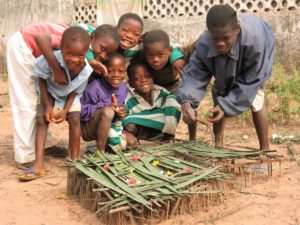
Agriculture- Ryvanz-Mia aims to be completely self-sustainable one day. Currently, our main business ventures are related to our farm and poultry. We would love to grow these businesses and add other business ventures
Arts/crafts
Music/Dance
Documentary film makers/photography
ACCOMMODATIONS AT RYVANZ-MIA
Housing
Volunteers stay on the second floor of the children’s home, which may not be accessed by children unless Mama Esi specifically gives permission. There are five double-occupancy bedrooms with locks on all doors and mosquito nets on all beds. It is expected that the volunteer tucks the mosquito net into their bed each night.
The volunteer accommodations do have a western style toilet. However, as water is often out, in order to flush the toilet the volunteer may need to get water from the water barrel in order to manually flush the toilet.
Bathing
At the end of the hall is a bathroom, which is only used by volunteers. The bathroom contains an indoor flush toilet and bathtub shower. The volunteer accommodations do include a shower, which has cold running water, however, water outages should be expected often. When there is no running water or water poor pressure, volunteers are able to use stored water located in a barrel in the shower room. Volunteers are expected to refill the water barrel as necessary by bringing water in from the outside well in buckets. Additional showering space is available outdoors for bucket showers.
The volunteer accommodations do have a western style toilet. However, as water is often out, in order to flush the toilet the volunteer may need to get water from the water barrel in order to manually flush the toilet.
Meals
All meals are prepared on-site during the three scheduled meal times. For volunteers who are teaching at the Delta Preparatory School, a bag lunch can be prepared and taken in the morning.
Volunteers who have special dietary needs or food allergies should note their needs on their volunteer application so Village Volunteers can notify the Ryvanz-Mia staff in advance.
Drinking Water
Purified drinking water is provided for volunteers. In the kitchen, they use ceramic water filters to filter all of the water used in cooking. This water is also used as drinking water for the children of Ryvanz-Mia. Volunteers, Ryvanz-Mia staff, and guests are provided with filtered water sachets (“bag water”). This water is kept in a fridge in the younger boys room and is always accessible for volunteers, whenever they are in the home. When out in town their water sachets are readily available for purchase, for approximately .05 USD.
Electricity
There is electricity; however, there are frequent power cuts. Volunteers are recommended to bring flashlights, candles, and matches.
Internet Access
The nearest internet café is approximately a 15-minute walk from the orphanage.
Laundry
Volunteers are expected to wash their own clothes, however, they should be prepared to receive a lot of assistance from the eager to help children! Laundry soap does need to be purchased, for about $1 per a couple of loads. Please note that all laundry is done by hand.
Laundry is very much a social activity in Kpando. The children love teaching the volunteers proper hand washing techniques! On Saturdays, all of our children wash their clothes together. At this time volunteers are encouraged to assist the children with their wash. Once the children’s laundry is completed volunteers are able to use the available buckets. Additionally, volunteers are permitted to wash their clothing at any other time throughout the week, however, we have found volunteers have very limited time throughout the work week.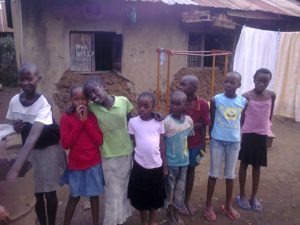
Food
Breakfast is typically some sort of combination of fresh fruit (bananas, mangoes, and oranges are very common), eggs, bread, and tea. Lunch and dinner include a starch (such as rice, cassava, and maize) served with a soup/stew. Meat (including chicken, goat, and grass cutter) is occasionally served, but it should not be expected multiple times a week. Fish is often ground and served in the meal (the fish is very fresh and comes from nearby Lake Volta). Typically food is spicy, volunteers should not hesitate to inform them if the require food to be milder.
Security
Ryvanz-Mia is surrounded by a gate, which is locked at night. Additionally, the doors to the home are also locked at night and each volunteer room has its own lock. Volunteers are not permitted to leave the compound after dark without a Ryvanz-Mia staff member.
Orientation
Volunteers are provided with an orientation upon arriving in Ghana in order to help the volunteer become aware of his/her local surroundings and safety concerns.
Volunteers are encouraged to purchase a mobile phone, which is carried on them at all times. The phone should have stored in it a minimum of three local emergency contact hours. One of these phone numbers will be his/her organization representative, who met the volunteer at the airport on his/her first day. This organization representative is available for the volunteer 24/7 throughout his/her stay in Ghana. Volunteers may either bring an unlocked phone and purchase a SIM card in Ghana (for approximately 2 USD) or they may buy a phone and SIM once they arrive in Ghana (approximately 20 USD for the cheapest model, which in our experience works perfectly fine for both international/local texting and calling). All incoming calls (both foreign and local) are free in Ghana. To call out (both foreign and locally) volunteers can purchase “top ups” easily, Mama Esi even generally sells top up credit so you don’t even need to leave the house!
Technology
There is electricity at Ryvanz-Mia which is freely available for volunteers to use. Please note that electricity in Kpandu is not always reliable and/or consistent.
Volunteers may either bring with them an unlocked phone and purchase a SIM in Ghana (for approximately 2 USD) or they may buy a phone and SIM once they arrive in Ghana (approximately 20 USD for the cheapest model, which in our experience works perfectly fine for both international/local texting and calling). All incoming calls (both foreign and local) are free in Ghana. To call out (both foreign and locally) volunteers can purchase “top ups” easily, Mama Esi even generally sells top up credit so you don’t even need to leave the house!
Ryvanz Mia allows you to have unlimited internet use for approximately. 1 USD an hour. Please note the internet is not always reliable and can be EXTREMELY slow!
Medical Emergencies
Volunteers should report any instance of illness or injury to a Rvyanz-Mia staff member. The volunteer will be escorted by a staff member to Margret Marquadt Catholic Hospital for treatment, the staff member will remain with the volunteer for the duration of his/her treatment.
As the hospital is ten to fifteen-minute walk away, generally volunteers will walk with a Ryvanz-Mia staff member to Marquardt Hospital. In the event that a volunteer is unable to walk to the hospital, a taxi would be called for transportation. If the volunteer needs to be transferred to a different medical facility an ambulance can be hired from Marquadt to handle the transfer.This hospital is able to handle most injuries and illnesses. However, for more serious cases, volunteers may need to be transported to the regional hospital in Ho (approximately a one to two-hour drive) or a hospital in Accra (approximately a three to six-hour drive).
Meet the Director of Ryvanz Mia: Mama Esi
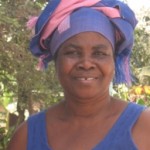 How Mama Esi became inspired to open a home for vulnerable children
How Mama Esi became inspired to open a home for vulnerable children
Within a short period of time, both Mama Esi’s husband and her eldest daughter passed away. As a result, Mama Esi decided that she wanted to do something to give back in their memory. After Mama Esi noticed the plight of orphaned and e vulnerable children in her community and decided to open a children’s home. The home was named Ryvanz-Mia after her deceased daughter (Ryvanz) and their first volunteer from Village Volunteers (Mia). Ryvanz-Mia is run out of Mama Esi’s personal home, which was constructed by her husband.
What obstacles did she face?
Over the past couple of years Mama Esi has run into one health problem after another. Due to her health concerns Mama Esi has been forced to spend a lot of time on bed rest, often away from the children’s home.
Mama Esi has also struggled with finding long term staff members, as positions at Ryvanz-Mia come with long hours and little pay (often even our full time staff work for on a completely voluntary basis)as a result of limited financial resources at the home.
As the children come to Ryvanz-Mia from very disadvantaged backgrounds, they often come to Ryvanz-Mia with some difficult issues. For example, children who have been living on the street are often accustomed to stealing, lying, and cheating in order to survive. Mama Esi teaches the children appropriate behaviors, while stressing that they are loved and supported at Ryvanz-Mia. Additionally many of the children come to Mama with health conditions (including Sickle Cell Anemia, malnutrition, etc) that need to be addressed.
What are her hopes for the future of the program?
Mama Esi dreams of continuing to grow Ryvanz-Mia children’s home. There are often children coming by the home seeking assistance, but unfortunately 95% of the time they must be turned away due to lack of finances. Mama Esi would also like to be involved in continuing to strengthen at-risk families through community education, business development, and financial assistance.
How has her partnership with Village Volunteers affected their work?
“Village Volunteers has allowed Ryvanz-Mia to grow! Thanks to Village Volunteers we have been able to build a kitchen/dining space, construct a chicken coop, and purchase farmland. We also love the volunteers that have come to Ryvanz-Mia through Village Volunteers- They have helped in education, health care, and support for the children. We especially appreciated the excitement to jump in and help in any way possible that all of our Village Volunteer volunteers come with!”
How does the community benefit from having volunteers?
Having volunteers allows us to grow our existing programs. Additionally, volunteers come with knowledge on a variety of subjects- which help us to further expand. Also, our children absolutely LOVE having volunteers spend time with us, as they can provide one on one time that is otherwise impossible.”
